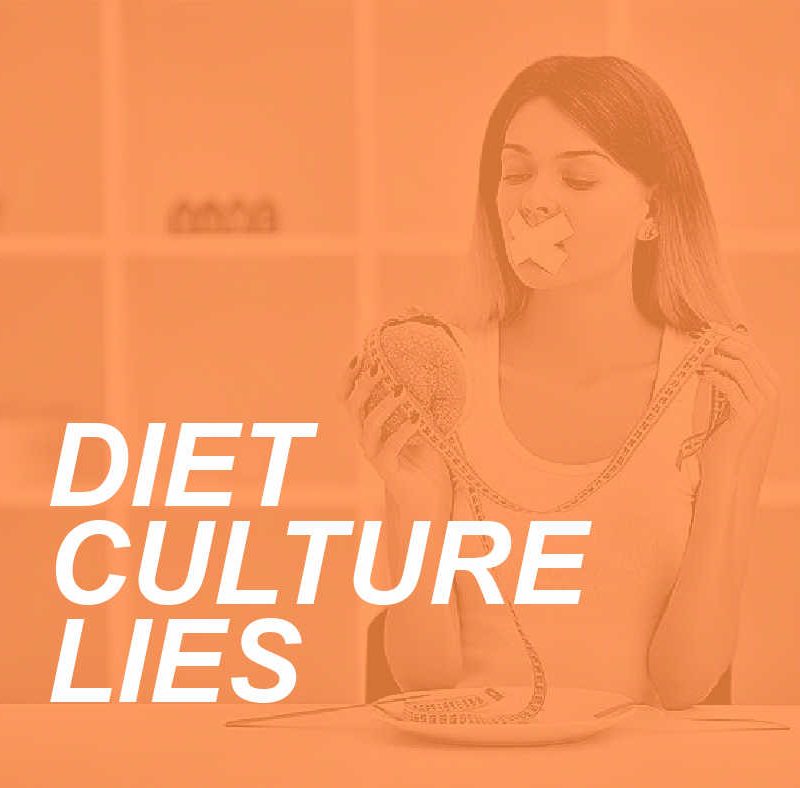
Diet culture is loud. It’s pervasive. It’s promoted and celebrated by individuals who are (mostly) not heavily credentialed and who make a linear connection between weight and health. As credentialed and practiced exercise professionals, we are uniquely positioned to help clients reject diet culture. As a group, we will likely never eradicate diet culture, but we can impact the rhetoric our clients hear by exposing diet culture lies for what they are.
10 Diet Culture Lies to Trash
Diet culture promotes more than these top ten, but the following myths represent the most common statements diet culture subtly (and sometimes overtly) is making.
1. Food is good or bad. Food is food. It’s fuel that carries a caloric content and nutrient profile. Food has no moral value; it cannot be “good” or “bad”. As a physical being who burns energy just by breathing and existing, food provides us a source of fuel that allows us to continue breathing and existing. Some foods are higher in nutrient density while others are lower. Some foods have a higher caloric value (like nuts and pizza) while others have lower caloric value (like green salad with lean protein or a piece of fruit). A diet too high in processed foods and too low in whole foods will likely yield negative health consequences, but avoiding them entirely is difficult and not necessary for most healthy bodies.
Despite what toxic diet culture tells us, both types of foods fit in a balanced life. In fact, the second key guideline in the 2020-2025 Dietary Guidelines for Americans encourages consumers to “customize and enjoy food and beverage choices to reflect personal preferences, cultural traditions, and budgetary consideration.” There’s nothing about “good and bad” foods in these guidelines (Dietary Guidelines, 2020).
2. Calories must be “earned”. As physical beings, we don’t need to earn calories or use food as a reward for movement. We. Need. Food. Food (or restriction of it) should also never be used as punishment for not getting a workout in. The important guideline here is to stay within a reasonable caloric limit associated with your daily physical activity pattern, dietary needs (and/or restrictions), age, and sex.
3. Carbs are bad or inherently fattening. In absence of a calorie surplus, no one macronutrient is “fattening”. Diet culture is famous for its roller coaster occurrences of demonizing (and/or promoting) one macronutrient over the other two. First, fat was bad and fattening. Then, we were lured into thinking high protein is the way to go. Now, carbs are bad, so let’s try Keto. Keeping up with diet culture’s shifting and misguided perspective is enough to burn a thousand calories in one sitting. Here’s the thing: we need carbs to think and perform higher intensity activities. Be aware of any diet that expressly tells consumers to “cut out” this or that. Even the dietary guidelines don’t favor extremism.
4. Sugar is evil. Consumers tend to confuse the type of carbs (therefore, sugars) the body needs at different times. For example, after an extremely strenuous competition, fast-digesting and easily absorbable carbs are useful to replenish muscle glycogen. In contrast, slower digesting carbs are more satiating and provide much-needed fiber and digestive benefits. Sugar is not inherently evil. Sugar is tasty. A problem is likely to surface when more added sugar is consumed than the body can use. Enjoy it in moderation, which is to be less than 10% of your daily caloric needs.
5. Weight loss is always the goal. Diet culture beats this drum over and over. “You have to lose weight to feel good and be fit.” This isn’t true. Bodies change over time – they are meant to evolve. The focus should not be about a number (especially one that fluctuates from day to day, hour to hour, etc.). The focus should be on optimizing personal wellness and bringing harmony to all aspects of life.
6. Being thin or “buff” solves all your issues. Oh, diet culture, how you like to lie. This is a myopic view of the cause of the issues people face. Being “thinner” or “taller” or “more defined” does not cure other ailments if the roots of the real issue aren’t addressed (i.e. mental health, stress, lack of social wellness, etc.).
7. Weight is a measure of both health and self-worth. Diet culture is inherently focused on the number on the scale. This thinking is flawed for multiple reasons. A person’s weight reflects their relationship with gravity – that’s it (if taken in isolation of other data points). Weight doesn’t highlight other important aspects of health such as body composition, strength, endurance, muscular balance, mental health, etc.
I don’t know about you, but nothing irritates me more than a visit to the doctor that begins with – not a conversation – but “please step on the scale”. This is annoying for several reasons. First, you’re fully dressed, it’s not first thing in the morning, your belly could be full of food and liquid, and yet – practitioners take this measurement and jot it down, but don’t follow it with a conversation about why it’s being measured. Believe it or not, you have a right to say, “I prefer not to step on the scale as it is triggering for me and really isn’t an accurate measurement of my weight or health.” I do this. I’m that person. Join me.
8. Gaining weight is bad, losing weight is good. Like the first big lie – weight has no moral value. We gain. We lose. We plateau. It’s all part of being human. The point at which we grow concerned is if weight continues to rise and a client experiences adverse health issues. There’s no good and bad – there are, however, patterns we can identify and interventions that can be implemented to change the course.
9. Thinner people are happier people. Please, someone show me valid and reliable scientific data with a thoughtful study design that asserts this. You won’t.
10. Your worth is reflected by your food choices. I saved this for last because I always find there’s an inherent judgment exercise professionals face (either internally from their own monologue or externally from observers). For example, I go out to dinner maybe once a month. Sometimes I order a salad with grilled chicken. Sometimes it’s cedar plank salmon with roasted veggies. Other times, I enjoy a good burger. Remember, food is neither good nor bad – it’s food. Just because you are an exercise professional does not mean you cannot or should not enjoy most foods in healthy and balanced ways.
Diet culture is all about image and restriction. A valid and scientific approach to health and fitness is rooted in behavior change, balance, and harmony. Instead of restricting, we focus on what we can add to bring a greater balance to a client’s eating pattern or exercise routine. We consider all aspects of wellness. This is where our power is and it is also one of the areas (of the thousands) where diet culture is just – well – wrong in its thinking. It’s not about the body. What we do focuses on one’s relationship with their body.







